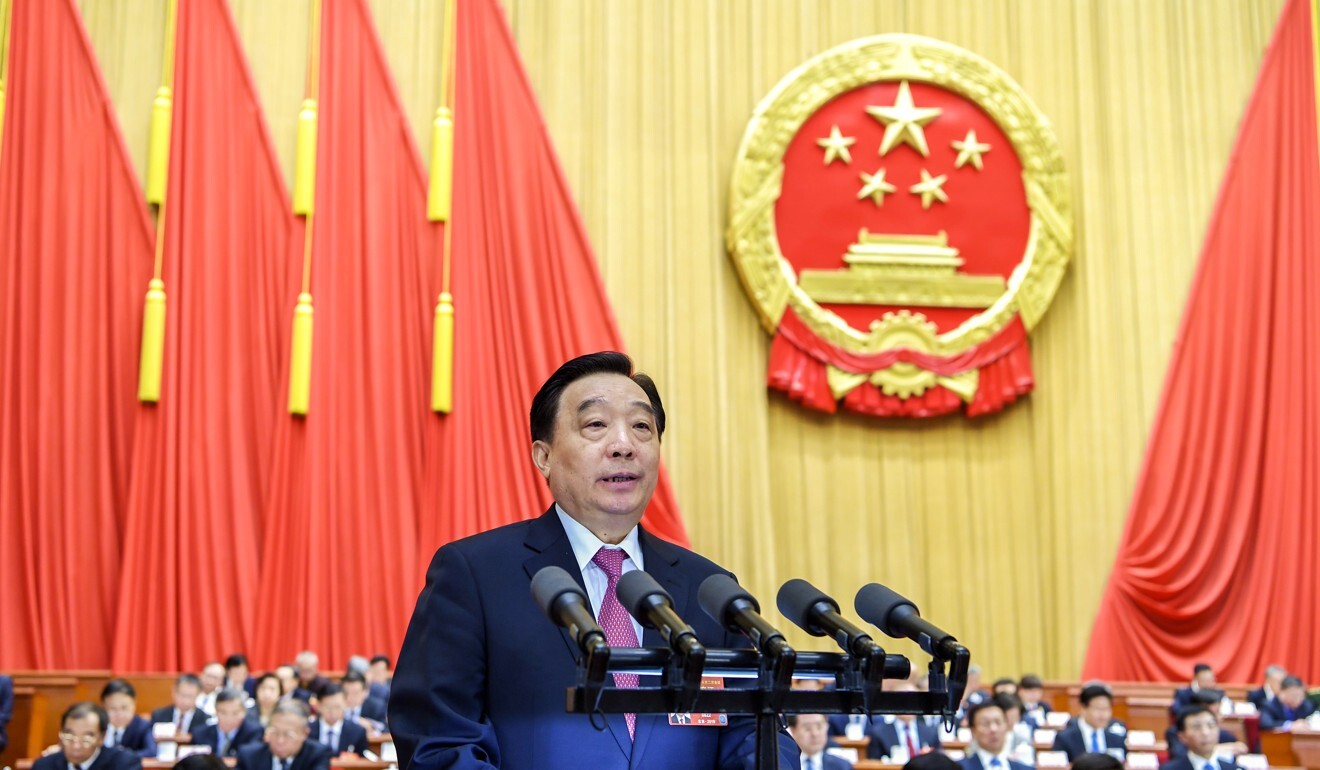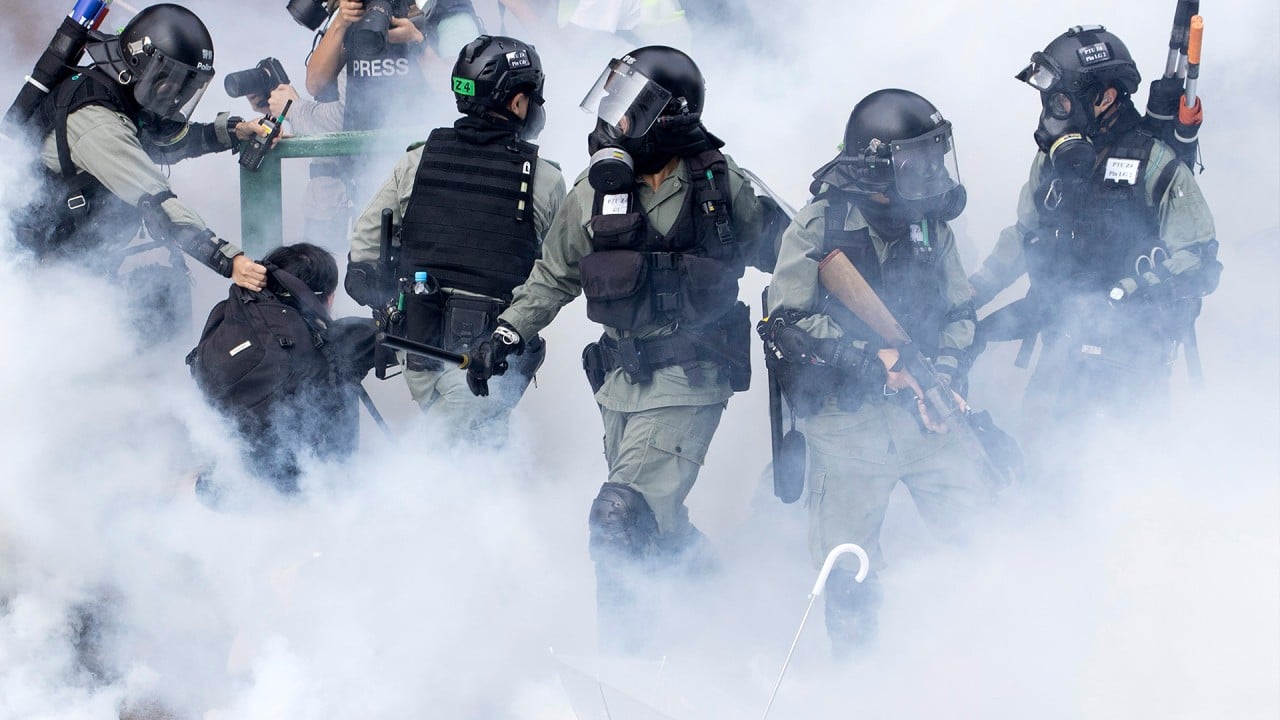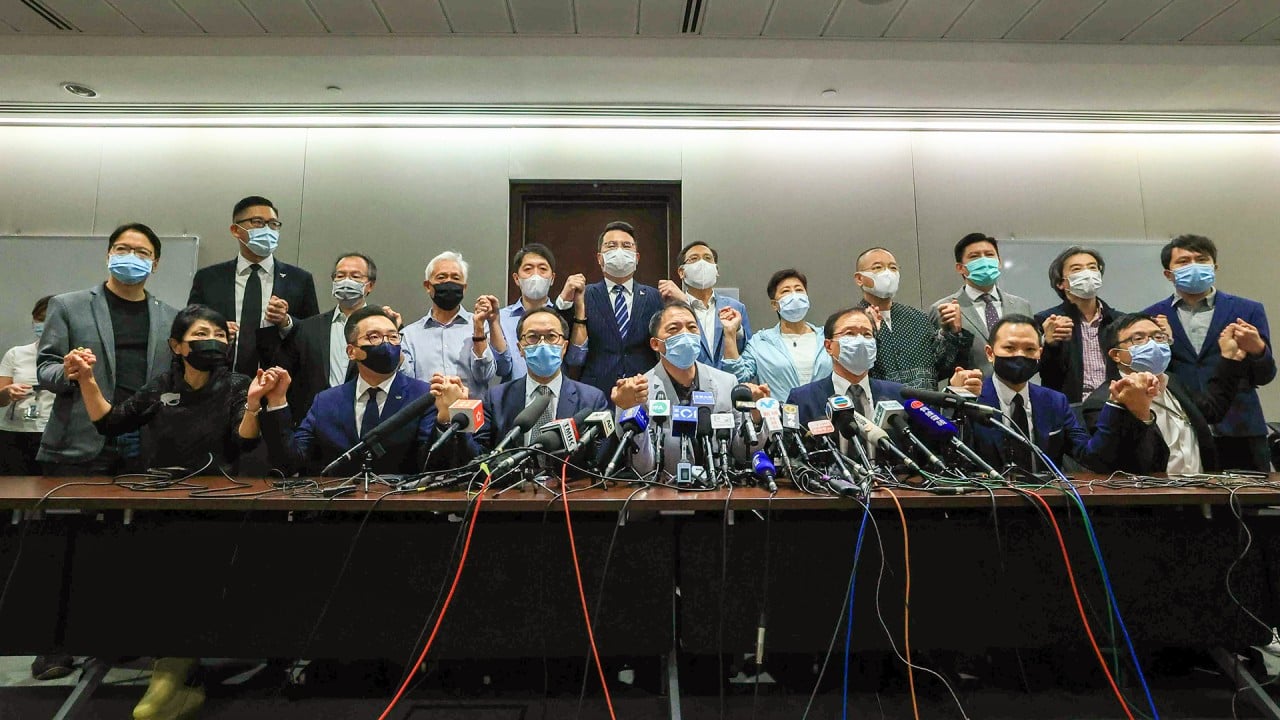
US diplomat summoned by Beijing for formal protest against sanctions on top Chinese lawmakers
- China condemns US action against state leaders as ‘hysterical bullying’
- The Chinese foreign ministry and office for Hong Kong denounce the move and warn there will be consequences
Chinese foreign vice-minister Zheng Zeguang summoned Robert Forden, who has led the United States mission to China since October, to protest the move, which he said was a serious interference in China’s internal affairs.
“Hong Kong affairs are the internal affairs of China, and the US has no justification to intervene,” Zheng said, according to a statement from the Chinese foreign ministry.
“China will make reciprocal countermeasures and continue to take all necessary measures to firmly defend the country’s sovereignty, security, and development interests.”
Zheng accused the US of being the “largest black hand” behind the chaos in Hong Kong, and of creating trouble for China through the excuse of human rights and democracy.

Zheng’s protest and warning followed strongly worded statements issued by the State Council’s Hong Kong and Macau Affairs Office and the foreign ministry commissioner’s office in Hong Kong on Tuesday. In its statement, the HKMAO said the US-imposed sanctions would only make China more determined to safeguard its national security.
“The move totally violates international law and the basic norms governing international relations,” it said. “It is hysterical political bullying. We express our strong condemnation and anger.”
The Office of the Commissioner said that, while Hong Kong was a rule-of-law city, “some American politicians, however, have openly provided a safe haven for criminal suspects in Hong Kong with the above-mentioned act on the pretext of human rights and freedoms”.
“It is a mockery of the international principle of the rule of law and an assault on Hong Kong’s judicial independence, in flagrant breach of the international justice and order,” it said.

07:30
China’s Rebel City: The Hong Kong Protests
The Hong Kong government said it strongly condemned the sanctions. “After months of malicious attempts to make use of incidents in Hong Kong to attack the PRC, it should be clear to all that the US government officials and politicians have chosen to ignore the constitutional order of Hong Kong as an inalienable part of the PRC,” a government spokesman said.
The spokesman stressed that the National People’s Congress and its Standing Committee had the constitutional power and duty to enact the law and apply it to Hong Kong in accordance with the Basic Law.
“The NPCSC also has the authority to interpret the Basic Law and to handle any constitutional problems arising from the implementation of the Basic Law,” he said.
Hong Kong is now a sticking point between China and US, says Tung Chee-hwa
The US move is the latest in a series of measures to punish Beijing for what the US government regards as an erosion of Hong Kong’s autonomy. It coincides with the passage of a bill by the US House of Representatives that would let Hongkongers live temporarily in the US.
In addition to Wang, the 13 other sanctioned individuals include Zhang Chunxian, another former Xinjiang party chief, and Chen Zhu.
These officials do not have any public dealings with the US but Chen is a foreign associate of the US National Academy of Science and a foreign member of the US Institute of Medicine.
The sanctions bar them from entry into the US, and were authorised through an executive order by US President Donald Trump concerning Hong Kong in July. This instituted many changes in Washington’s treatment of Hong Kong as distinct from China.
What Trump’s executive order means for Hongkongers
The national security law which prompted the sanctions aims to prevent, stop and punish acts identified as secession, subversion of state power, terrorism and foreign interference. Opposition politicians and critics warn it could be used to suppress dissent and erode freedom in the city.
“Beijing’s unrelenting assault against Hong Kong’s democratic processes has gutted its Legislative Council, rendering the body a rubber stamp devoid of meaningful opposition,” Pompeo said.
“One aspect of that assault has been the actions of the National People’s Congress Standing Committee, which have effectively neutered the ability of the people of Hong Kong to choose their elected representatives in keeping with the Joint Declaration and Basic Law,” he said.
“The Department of State is holding accountable those responsible for these brazen acts.”

04:08
Hong Kong opposition lawmakers to resign en masse over Legislative Council disqualifications
Pompeo, who will be handing over the State Department to a new administration next month, has been issuing restrictions and edicts regarding China on an almost daily basis, deepening US-China rifts ahead of the inauguration of Trump’s successor, Joe Biden.
On Friday, he announced new visa restrictions on Chinese government officials who belong to or are affiliated with the United Front Work Department, which operates with a broad mandate to strengthen adherence to the party both within and outside China.
Chinese observers were surprised at the latest step by the outgoing Trump administration to punish the group of top officials at China’s legislature, who hold the rank of state leaders.
“The intensity of the latest administrative sanction is unprecedented,” said Shi Yinhong, a specialist in US affairs at Beijing’s Renmin University. “We’ve heard rumours about possible sanctions over Hong Kong, but few had actually expected that state leaders would be targeted.”
Trump could punish Hong Kong in event of election defeat, expert warns
From Beijing’s perspective, punishing top Chinese officials as well as the adoption of a new bill granting Hongkongers “temporary protected status” sent out wrong messages and posed potentially long-term threats to the city’s stability and prosperity, as well as to bilateral ties, he said. “The incoming administration of Joe Biden may find it hard to reverse those steps.”
Pompeo’s response to Hong Kong’s national security gained momentum after Wang’s committee empowered Carrie Lam Cheng Yuet-ngor’s government to unseat politicians without having to go through the courts – a move US national security adviser Robert O’Brien called a violation of Beijing’s commitment to the city.
Following the change, four opposition lawmakers in Hong Kong’s Legislative Council were removed. The remaining 15 opposition legislators then resigned in protest.

01:24
Hong Kong leader Carrie Lam says she gets around sanctions by collecting her salary in cash
Huang Jing, dean of the Institute of International and Regional Studies at Beijing Language and Culture University, said Washington’s latest moves gave the Biden administration “little room for compromise” with China.
He noted the series of steps adopted by the Trump administration since the election, including the visa ban targeting Chinese Communist Party members. “It is clear that policy hawks and ideological hardliners on both sides are in control of the situation and it would be extremely difficult for anyone to try to lower tensions.”
Huang said Beijing should remain extremely cautious when considering countermeasures. “China should stay calm and pause for a while before making any moves that could cause real damage to bilateral ties. I am really worried that China may follow America’s example and roll out retaliations targeting top US lawmakers or other federal and state officials,” he said.
“It would be wise for Beijing to exercise restraint and reiterate its hopes for the Biden administration to make things better.”
On South China Sea, expect more of the same from Biden’s US
The House of Representatives on Monday passed the Hong Kong People’s Freedom and Choice Act of 2020, which would give Hong Kong residents “temporary protected status” in the US for five years. The bill will need Senate approval before heading to Trump’s desk to be signed into law.
The bill also seeks to expedite the processing of refugee applications from Hongkongers, which will not be subject to the Trump administration’s existing cap on overall refugee admissions.



